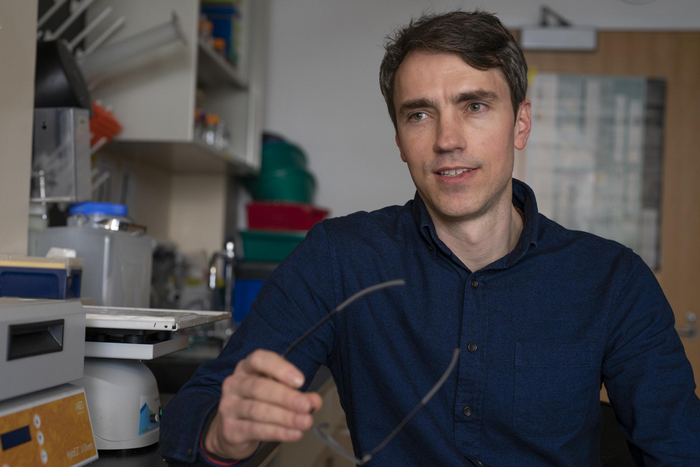University of School of Medicine researchers have identified a gene that plays a crucial role in determining our risk for heart attacks, deadly aneurysms, coronary artery disease and other dangerous vascular conditions.

Credit: Dan Addison | UVA Communications
University of School of Medicine researchers have identified a gene that plays a crucial role in determining our risk for heart attacks, deadly aneurysms, coronary artery disease and other dangerous vascular conditions.
The discovery advances our understanding of the underlying causes of a wide range of serious health conditions, including atherosclerosis (hardening of the arteries), and moves us closer to new treatments and preventive measures that could help people live longer, healthier lives.
“The first step towards translating the knowledge of population risk for vascular disease is disentangling the fundamental cellular processes that could be affected. Ideally this can be done systematically in disease-relevant models,” said principal investigator Clint L. Miller, PhD, of UVA’s Center for Public Health Genomics and Departments of Biochemistry and Molecular Genetics and Public Health Sciences. “By gaining insight into the gene regulatory networks that underlie specific vascular disease pathways, we can develop more tailored interventions or risk metrics for patients.”
Genetic Factors in Vascular Disease
Lifestyle choices such as smoking, sedentary behavior, and a diet heavy in red meat play major roles in the development of vascular diseases such as coronary artery disease, a leading cause of death worldwide. But our genes, the genetic material we inherit from our parents, also shape our risk. Understanding precisely how, however, has been a major challenge for scientists.
This is because the subtle changes that take place in our blood vessels over time are extremely complex. In coronary artery disease, for example, scientists have determined that genes that affect our risk can be found at more than 300 locations on our chromosomes. That’s a vast area for scientists to explore.
The new discovery from Miller and his collaborators, however, identifies a gene that directs an entire network of genes and processes. In that sense, the gene, FHL5, is like a general deploying troops on the battlefield. That makes it an extremely attractive molecule for scientists seeking to unravel the targetable pathways for new treatments or prognostic tools.
To understand how the FHL5 encoded protein functions, Miller and his team evaluated its effect on smooth muscle cells, the cells that form the structure of our arteries. They found that when FHL5 was too active, the cells began to calcify – to accumulate too much calcium. This is a key step in atherosclerosis, the buildup of harmful plaque in the arteries that can lead to heart attacks, strokes and other serious health problems. Further, the excess gene activity contributed to other critical cellular activities related to vascular disease.
But FHL5’s role doesn’t stop there. Instead, the scientists found, it has a far-reaching effect on other genes and cellular processes that shape the “remodeling” that occurs in our arteries over time, the researchers report in a new scientific paper. “By mapping the downstream effectors of vascular remodeling, we hope to shed light on preventative mechanisms,” Miller said. “Unbiased genetic studies led us to this specific cofactor. However, studying its regulatory network could explain its link to several vascular diseases.”
The identification of this key regulator gives scientists important new insights into the genetic factors that contribute to vascular diseases – and provides an attractive and influential target as they develop new treatments and work to prevent the harmful changes that cause those diseases.
“We hope this work serves as template for future studies to investigate the functional consequences of perturbing key regulators in the vessel wall,” Miller said. “Translating this knowledge to the clinic will require ongoing interdisciplinary collaborations, and we look forward to ultimately seeing the impact of these genetic studies.”
Findings Published
The researchers have published their findings in the scientific journal Circulation Research. The team consisted of Doris Wong, Gaëlle Auguste, Christian L. Lino Cardenas, Adam W. Turner, Yixuan Chen, Yipei Song, Lijiang Ma, R. Noah Perry, Redouane Aherrahrou, Maniselvan Kuppusamy, Chaojie Yang, Jose Verdezoto Mosquera, Collin J. Dube, Mohammad Daud Khan, Meredith Palmore, Jaspreet K. Kalra, Maryam Kavousi, Patricia A. Peyser, Ljubica Matic, Ulf Hedin, Ani Manichaikul, Swapnil K. Sonkusare, Mete Civelek, Jason C. Kovacic, Johan L.M. Björkegren, Rajeev Malhotra and Miller. Miller has no financial interest in the work; a full list of the authors’ disclosures is included in the paper.
The research was supported by the National Institutes of Health, grants R01HL148239, R01HL164577, R00HL125912, F31 HL156463, R01HL142809 and K01HL164687; and the Fondation Leducq, ‘PlaqOmics’ 18CVD02.
To keep up with the latest medical research news from UVA, subscribe to the Making of Medicine blog.
Journal
Circulation Research
DOI
10.1161/CIRCRESAHA.122.321692




